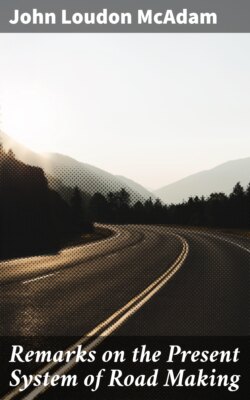Читать книгу Remarks on the Present System of Road Making - John Loudon McAdam - Страница 10
На сайте Литреса книга снята с продажи.
Extracts from Observations on the Highways of the Kingdom, by John Loudon MᶜAdam, presented to a Committee of the House of Commons, and printed by order of the House, 14th June 1811.
ОглавлениеTable of Contents
“In all the Reports of Committees of the House of Commons on the subject of Roads, they seem to have had principally in view the construction of wheeled carriages, the weights they were to draw, and the breadth and form of their wheels; the nature of the roads on which these carriages were to travel has not been so well attended to.”
“The observations I have made in a period of twenty-six years on the roads of the kingdom, in which time I have travelled over the greater number in England and Scotland, and the opportunities I have had of making comparisons on the different materials and the modes of their application, have led me to form the following conclusions.”
“1st. That the present bad condition of the roads of the kingdom is owing to the injudicious application of the materials with which they are repaired, and to the defective form of the roads.”
“2nd. That the introduction of a better system of making the surface of roads, and the application of scientific principles, which has hitherto never been thought of, would remedy the evil.”
“In illustration of these positions, I beg to observe, that the object to be attained in a good road, as far as regards the surface, is to have it smooth, solid, and so flat as that a carriage may stand upright; these objects are not attained by the present system, because no scientific principles are applied; but it is presumed they are perfectly attainable in all parts of the country.”
“Stone is to be procured in some form in almost every part of the kingdom, and a road made of small broken stone to the depth of ten inches, will be smooth, solid and durable.”
“The materials of which the present roads are composed, are not worn out; but are displaced by the action of the wheels of carriages upon stones of too large a size: the wheel does not pass over the materials of which the road is formed, but is constantly, almost at every step, encountering an obstacle which must either give way and be removed, or the carriage must be lifted by the force of the cattle so as to surmount it; in either case the road is injured, and the carriage impeded, and the injury and impediment will be great in the exact proportion to the number and size of the obstacles.”
“The size of stones for a road has been described in contracts in several different ways, sometimes as the size of a hen’s egg, sometimes at half a pound weight. These descriptions are very vague, the first being an indefinite size, and the latter depending on the density of the stone used, and neither being attended to in the execution. The size of stone used on a road must be in due proportion to the space occupied by a wheel of ordinary dimensions on a smooth level surface, this point of contact will be found to be, longitudinally about an inch, and every piece of stone put into a road, which exceeds an inch in any of its dimensions, is mischievous.”
“The roads in Scotland are worse than those in England, although, materials are more abundant, of better quality, and labour at least as cheap, and the toll duties are nearly double; this is because road-making, that is the surface, is even worse understood in Scotland than in England. By a late discussion in Parliament on the subject of Mail Coaches paying toll, it was universally allowed that the roads in Scotland were in a deplorable state, and in their circumstances, bankrupt.”
Note.—It is understood, that the Postmaster-General was obliged to give up the mail-coach from Glasgow to Ayr, on the road towards Ireland, on account of the expence of tolls, and the bad condition of the road; there being ten turnpike gates on thirty-four miles of road.
During nearly five years that the writer has given his whole attention to the improvement of the Turnpike Roads, experience having confirmed his ideas on the subject, no endeavours have been spared, to extend the benefits which have already resulted to the Bristol district, over the whole country. The very limited means possessed by any individual for influencing this important branch of domestic economy, has occasioned frequent attempts to convey instructions for road-making in writing. This method has never been entirely successful; it being impossible to acquire a mechanical art without actual practice; or to obtain any just ideas of it, beyond the first principles, from books.
These principles are, that a road ought to be considered as an artificial flooring forming a strong, smooth, solid surface, at once capable of carrying great weight, and over which carriages may pass without meeting any impediment.
